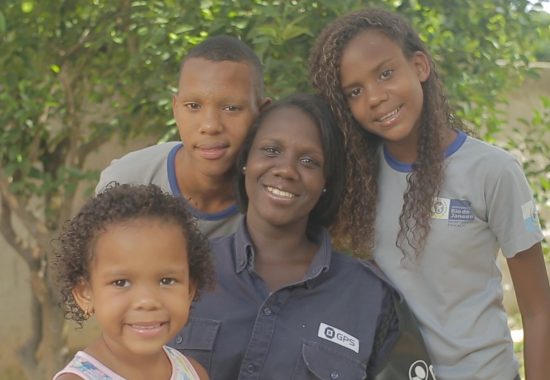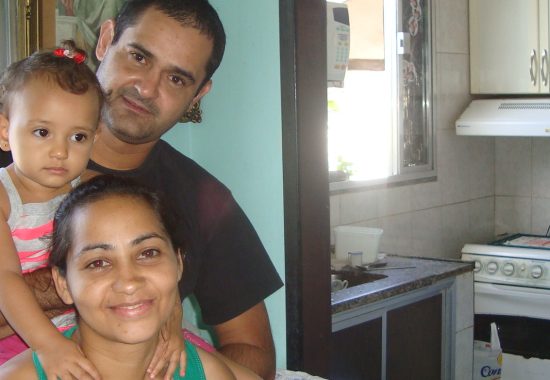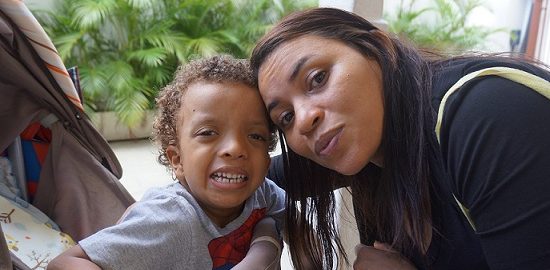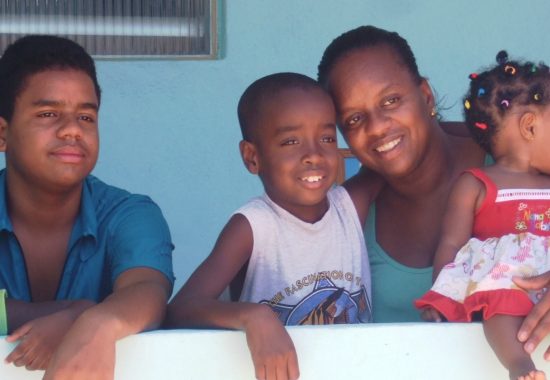

Vanessa Regina’s testimony
Vanessa Regina discovered herself as an entrepreneur and educator at Instituto Dara. Vanessa founded the ‘Associação Ler e Saber na Comunidade’ (Reading and Knowing in the Community) Association, an NGO that encourages reading in the Congonha slum, in the neighborhood of Madureira, in the North of Rio de Janeiro.
“October 27, 2019 was one of the most exciting days of my life. On the screen of the National Foundation for Children’s and Young People’s Books, about three meters high, it was written ‘Reports of experiences in the promotion of reading’, my name and, next to it, ‘social entrepreneur’.
I remember getting to the Foundation was difficult on that day. I had take the BRT [a type of public transport in Rio de Janeiro] without paying the ticket, and I only had cookies in my pocket to eat – and I hate cookies. But when I saw my name on the screen, all the difficulty gave way to another memory. “Auntie, this place is so beautiful,” said one of the children assisted by our project. The library was under construction, and all I could see was dust, rubble, and delay. I asked the child what he was seeing. “I see a beautiful library.” He saw the power of that space.
I often say that children restore our hope, and that’s what happened that day. I saw my name on the screen, and I could see the beauty that the boy had seen in that unfinished work. A month later, the work was completed, all done with donations, and we inaugurated the headquarters of ‘Ler e Saber’ and the project’s library: Teacher Maria da Graça Soares Valente Community Library, “Aunt” Graça. The name is a tribute to a teacher of mine from my childhood days. She gifted me the book ‘A Bolsa Amarela’ (The Yellow Bag), by Brazilian writer Lygia Bojunga, and awakened in me the passion for reading.
Sometimes, we can’t see the beauty of things when we have so much to do.
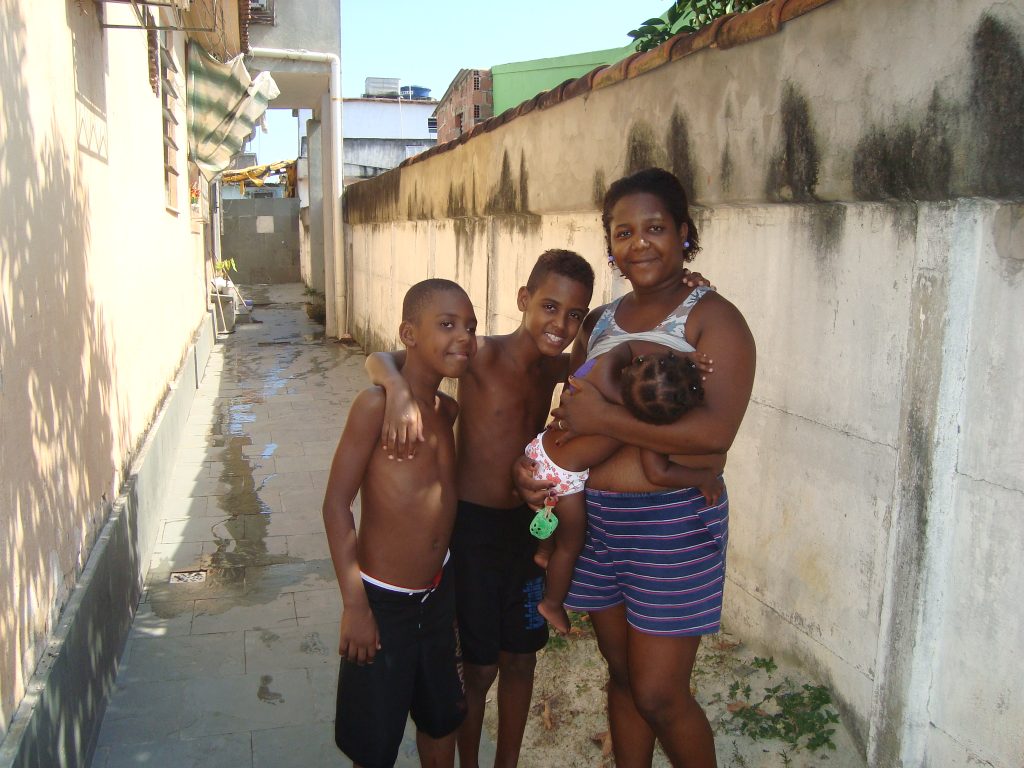
When I arrived at Instituto Dara in 2010, I was overwhelmed. I didn’t recognize myself. I was unemployed – I used to have a great job –, had two teenage children and a baby with a respiratory disease that no one could diagnose. I was defeated. Anyone who sees the pictures the folks at Instituto Dara took when I got there cannot believe it. I was a lost woman who smiled with sad eyes. I couldn’t see the bright side of things, of everyday life as a family. Everything was blurred, even living with my children. The Institute helped me regain my citizenship and, with that, reconnect with the people I loved the most. It was a hard time, in which I had to rediscover myself as a person. I just wondered: “I’m overweight, my hair doesn’t look good, and my husband doesn’t love me anymore. I only carry my daughter all the time and I can’t take care of my children anymore; I don’t even want to get out of bed.” Dara’s psychologist helped me understand that all was not lost, that there was a way forward, and that I needed to take care of myself.
Concurrently, I learned from the teams in other areas how to take care of my health and make healthier choices for our meals at home. We were also given support with special milk for the baby, medicines and a food allowance.
“What are you doing to change the situation you are in?” It was the question that changed my life. That struck a chord with me, because I complained but did nothing to change the situation. How did I want something new to happen if I wasn’t doing my part? I understood that I had to treat my mind. I was feeling unworthy to send a resume. I couldn’t remember the last time I had prepared and sent one.
Inside the slum, we are raised to be the poor little one. My mother made an absurd effort for us to study and understand ourselves as citizens. But in the whirlwind of events, I forgot about it. When I got healthy, I became more patient, I went back to being the loving person I used to be, taking care of my home, my appearance. I went back to doing my thing at a slower pace, breathing before speaking and having more patience to listen. Then everything started to get better. I needed someone to listen to me, and I got that at Instituto Dara. The day I understood that I needed to go after my rights, but I also had to react, that I had duties… The day I understood that I needed to do my part, things began to change.
My perspective had changed, and so had my children’s. My son helped me put together a resume. Sometime later, I did my first job interviews. I didn’t take long until a photographer who is a friend of mine took my resume to the agency where he worked and set up an interview for me. It was in Urca, in the South Zone of Rio de Janeiro, and it was a mansion! “No, I am not going,” I replied.
I didn’t feel up to it, the job required knowledge I didn’t have. My friend replied: “Yes, you are, because I’ve already scheduled the interview, if you don’t show up I’ll feel bad’. I did go, but very scared, nervous.
At the end of the day, they called me: “Can you start tomorrow?”
That was a turning point in my life, because the salary was good, I had health insurance for me and my children, as well as food and meal vouchers. And I loved working there. In two months, when things got back on track, I returned to Instituto Dara to have the staple food basket and the cans of milk canceled, so that other families could benefit from them. I was left with only the medicines, which were still very expensive, until the day I may journey at Dara was completed.
Since then, I have discovered myself as an educator and an entrepreneur.
Today I dedicate my time to the NGO I created in the community where I was born, in the Congonha slum. In 2015, I founded ‘Ler e Saber na Comunidade’ (Reading and Knowing in the Community), a project to encourage reading, access to children’s books and a community library. We have a dream, which is to tell the story of the Congonha slum, where our project is located. Because this community is invisible to society, it only appears in the news when a tragedy happens, like the one that happened in 2014. The name ‘Congonha’ hit the headlines because a woman, Claudia, a janitor, was shot by the police and, after being rescued by the police pick-up truck, ended up sliding through the truck bed, got trapped by her clothes and was dragged on the asphalt for at least 350 meters. It’s because of stories like this that people hear about Congonha, and we want to change that.
I work with children and teenagers, but also with mothers. And I use my experience with Instituto Dara as an inspiration. In conversation circles, such as at the time of Dara’s ‘Aconchego’ project [a daily activity where the families served discussed and were listened], I encourage the empowerment of these women in all areas, so that they may return to the job market, study, and find a real partner, not someone who makes them suffer violence. A bit of what the social worker and the psychologist at Dara told me I pass on. With these tools, I seek to bring about change.
At Instituto Dara, I learned to respect processes and transform lives, not just to lend a helping hand. We are not a welfare institution, we are a cultural association; it has art, it has a library. Because the book collection there is not mine; it is available to the community. Today, we have 5,000 books cataloged and many still in boxes. And we offer four activities, in addition to book loans: reading mediation, braiding workshop, dance class, and audiovisual workshop for teenagers. I want people to look at the institution as part of their home.
In 2022, we did a joint effort with graffiti artists on the street that leads to the ‘Ler e Saber’ library so that people could see from a distance that a cultural project was working there. It was on a beautiful Sunday, I wept so much. I have never seen the community so mobilized like on that day. Everyone participated; people allowed the walls of their houses to be painted and offered coffee and water. And the children became assistants to the artists.
I am very proud to be recognized in my community as an cultural agent, a mobilizer, and not just as “Aunt Vanessa”. I’ve lived in this community for over twenty years and haven’t seen anything change.
With the arrival of ‘Ler e Saber’, we transformed many stories. And there is more to come.”
